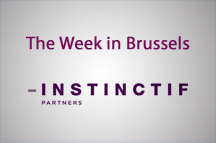 Well, you can guess the big news this week from Brussels – the collapse of the German coalition talks between the CDU, FDP and the Green (the Jamaican coalition). This is rather unprecedented in modern Germany as the country faces either a minority government, a recast of the CDU – SPD coalition or new elections. Given the great pride German citizens take in stability and the desire of German President Frank-Walter Steinmeier to avoid elections means a potential minority government propped up by the SPD who do not want to enter into another coalition with the CDU.
Well, you can guess the big news this week from Brussels – the collapse of the German coalition talks between the CDU, FDP and the Green (the Jamaican coalition). This is rather unprecedented in modern Germany as the country faces either a minority government, a recast of the CDU – SPD coalition or new elections. Given the great pride German citizens take in stability and the desire of German President Frank-Walter Steinmeier to avoid elections means a potential minority government propped up by the SPD who do not want to enter into another coalition with the CDU.
The ripples of this development fall way beyond the German border. In Brussels the ability of the German government to drive through reform will diminish. A holding pattern will develop as the Chancellor will not wish to make any decision which costs her political capital at home. The good news is that there are not many critical decisions before the end of the year so this buys the CDU some time to chart a course for the next steps in resolving the dilemma.
It is interesting to note the precarious positions of governments across Europe where minority or unstable governments are the norm – Ireland, Spain, Sweden, UK, Netherlands, Italy to name a few. What will this mean when the Commission launches its 2025 reform agenda next year with key policies on increased competence for the EU, an EU defence agenda, and a review on own resources for the EU budget kick into motion.
 Under the radar of the German election news, the work of the institutions kicked up a pace this week. News that critical and often bitterly fought dossiers made progress this week was noted. The Digital Single Market agreed key points on geo-blocking (the ability to buy goods from anywhere in the EU on any website), Copyright, the Cable and Satellite Directive recast, audiovisual medias services and digital contracts. Across the hall in the European Parliament, the Economic and Affairs Committee was grilling Commissioner Valdis Dombrovskis on the status of the Capital Market Union. Amongst its concerns were the slow progress of the dossiers such as the European Deposit Guarantee Scheme and the Fintech portfolio.
Under the radar of the German election news, the work of the institutions kicked up a pace this week. News that critical and often bitterly fought dossiers made progress this week was noted. The Digital Single Market agreed key points on geo-blocking (the ability to buy goods from anywhere in the EU on any website), Copyright, the Cable and Satellite Directive recast, audiovisual medias services and digital contracts. Across the hall in the European Parliament, the Economic and Affairs Committee was grilling Commissioner Valdis Dombrovskis on the status of the Capital Market Union. Amongst its concerns were the slow progress of the dossiers such as the European Deposit Guarantee Scheme and the Fintech portfolio.
There were also three other notable newsworthy items this week. The first was the apparent successful conclusion of the EU 2018 budget. Agreement settled around the 160 billion euros mark and shows just how small the budget is compared to Member States. UK Chancellor Philip Hammond unveiled an 800 billion [1,040 billion euros] sterling spending budget in comparison. The second bit of headline grabbing news was the award of the European Banking Authority to Paris and the European Medicines Agency to Amsterdam. There was a collective wringing of hands at the non-selection of a central or eastern European country taking one of the prizes, but staff surveys indicated a strong preference to a western European country, which in the end probably swung the voting to Paris and Amsterdam. Finally, the EU Commission passed judgment on each Member States budgetary plans. Paris came in for a slight hand slapping on its inability to reduce the structural deficit along with Belgium, Austria, Portugal, Slovenia and Italy who also fall short of the bar with the basic concern about these government’s commitment to meeting the terms and conditions of the Stability Pact.
And which article can get away without adding another few lines on Brexit. Will 20 billion more sterling do the trick in getting the EU to the negotiating table on a new trade deal? First messages out of Brussels are no, unless it is the start of potentially more money. And Northern Ireland has suddenly flared up as a point of contention again on the border and customs issue.
It would be hard to say this week was uneventful in Brussels and EU officials must be longingly looking at that calendar for the holiday respite.














